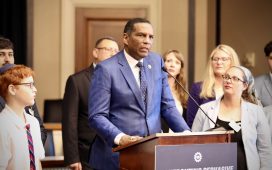Subscribers to The New Yorker’s new 2020 election newsletter, On the Trail, received this piece in their in-boxes. Sign up to receive future installments.
The campaign trail has always been a metaphor. There’s no prescribed path for a candidate to trek down, just a set of practices that have evolved over time: the arena rally, the theatre-in-the-round town hall, the flapjack-diner visit, the fancy-dinner fund-raiser, et cetera. On Wednesday, Joe Biden did none of those things. Instead, he held a press conference on Zoom. He sent out an e-mail newsletter. He announced in that newsletter that he was launching a podcast. He blogged. He hosted a “happy hour” “virtual roundtable” focussed on “the issues Young Americans care about.”
The coronavirus outbreak has upended all corners of America, including the Presidential campaign. The timing of the emergency means that it hasn’t exactly interrupted the Democrats’ nominating process—Biden’s victory over Bernie Sanders in Michigan, on March 10th, pretty much ended the race—but it has, at the moment of Biden’s triumph, resurfaced many of the questions that dogged him from the start of his campaign. Is he up for the enormity of the task before him? Can he find a voice to meet this moment? Can he cut through the sheer amount of noise that Donald Trump makes?
As states and cities began to shut down earlier this month, scientists and doctors began speaking out about what measures were necessary to combat the coronavirus. Lawmakers began debating government measures that could both fund the medical response and account for the devastating economic fallout. Trump began appearing at daily White House press briefings, which have become, day by day, more like campaign rallies. Andrew Cuomo, New York’s governor, has held his own daily briefings, projecting a sleeves-rolled-up-in-a-crisis style of leadership. Many of Biden’s erstwhile opponents have found roles for themselves. Sanders, still running for the Democratic nomination, has, from the vantage of his seat in the Senate, tried to exert some pressure on Washington from the left. His campaign, meanwhile, has made use of its facility with and reach on digital platforms to host all manner of live-stream content for supporters. Elizabeth Warren has tried to play lefty referee, as well, while Amy Klobuchar has stood up for election reforms that might be needed if the pandemic is still with us in the fall. Barack Obama, Biden’s old boss, has used his Twitter account to highlight news articles he deems helpful. Many members of the Obama-Biden Administration have been visible online or on television as issue experts. Ron Klain, the longtime Biden aide who managed the White House’s Ebola response in 2014 and 2015, has been doing a podcast on the coronavirus since late February.
As all this has been happening, Biden was slow to find his footing. On Wednesday, during his Zoom press conference, he said that it had taken four days for his campaign to set up live-streaming equipment in his rec room. “I wish I were still in the Senate, being able to impact on some of these things, but I am where I am,” he told reporters. “My main focus, believe it or not—it’s not a political focus—is to make sure we handle this crisis well.” This week, Biden spent time speaking about the need for Washington to take care of millennials and Generation Z in its legislative response to the crisis—talk aimed at the demographic that voted overwhelmingly for Sanders in the primaries to date. He’s talked about the need to protect gig workers, and called for forgiving student debt and listening to scientists. Where he’s sounded most assured is when he has touted his experience overseeing the American Recovery and Reinvestment Act, under Obama. “Implementing this bill is going to take a whole lot of flyspecking, a whole lot of work,” Biden said on Wednesday, referring to the two-trillion-dollar relief package working its way through Congress. “That’s what we had to do when I was in charge of executing the Recovery Act.” But a potential Biden Administration, if it ever comes, is at best ten months away. He’s not in a position to oversee anything. His job now is to cut through.







